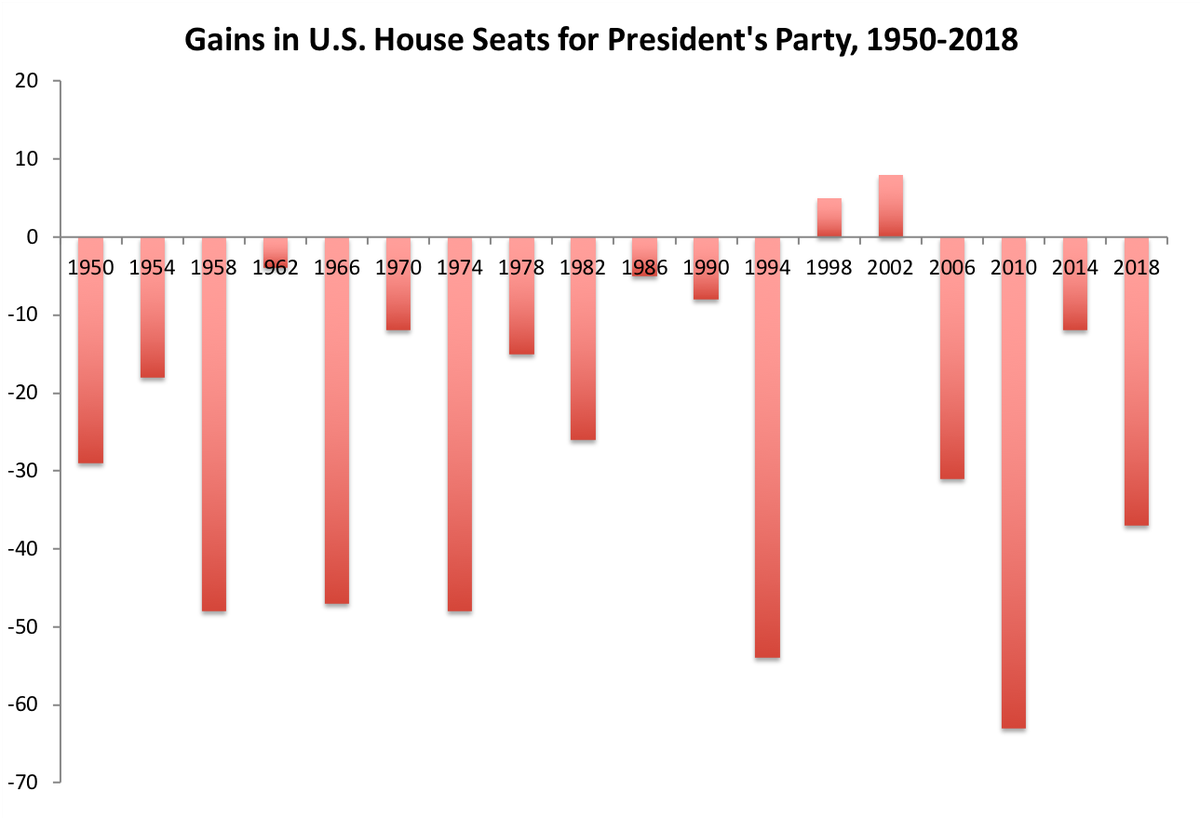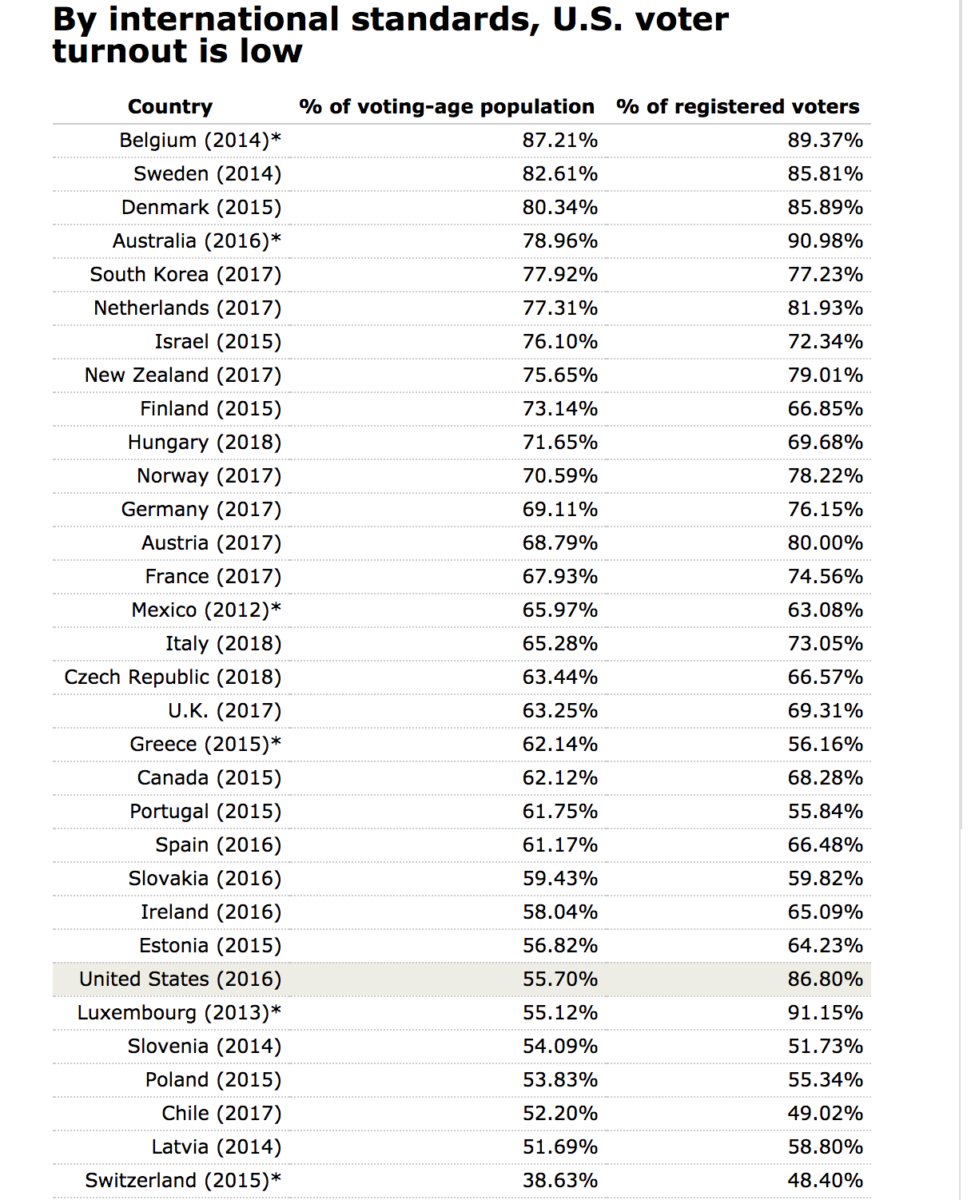
Source: 538
Yesterday, I discussed what the Democrats should focus on (4 Agenda Items the New Congress Should Embrace) with their new found House Majority (latest estimates is that they picked up 37 seats):
1. Infrastructure
2. National Minimum Wage
3. Fiduciary Rule
4. Climate Change
I try to stay in my lane, and focus on those issues with ramifications for markets, investors, and the broader economy.
However, there were numerous non-economic issues that I believe are worthwhile to discuss. If you will indulge a moment, I think these three are rather interesting political concerns worth further exploration.
• Voting Rights: 2018 might become known as the year we discovered just how pervasive voter suppression has become in the United States.
I assumed there was Gerrymandering and that both sides do it; but I had no idea just how institutionalized voter suppression campaigns had become. This year we learned how bad it has become in places like Texas – where its no accident that the electorate looks so very different than the citizenry.
It is not representative of the American ideals of democracy.
The second would be to pass a series of voting right guarantees that would limit the state by state suppression. When the electorate looks very different then the citizen population, you have an issue with minority rule.
That’s before we even get to Georgia, which is looking more like a 3rd World Banana Republic than a major state in the USA. I have no answer to the embarrassing questions people from Hong Kong or the UK have asked me about this. It is simply unAmerican that this occurs; its even worse that it is tolerated by Congress and the Supreme Court.1
This is a winning issue for all Americans regardless of party.
 • Voter Turnout: For the oldest democracy in the world, this is a repudiation of our core values – and similarly embarrassing. Not only that, but we also have one of the lowest voter turnouts of any advanced nation.
• Voter Turnout: For the oldest democracy in the world, this is a repudiation of our core values – and similarly embarrassing. Not only that, but we also have one of the lowest voter turnouts of any advanced nation.
More eligible voters chose to stay home in 2016 than cast a ballot for either major party candidate, and by a wide margin: 27.4 percent voted for Trump, 28.6 percent for Clinton, and 44.0 percent of eligible voters did not bother.
Look at the list of countries at right whose citizens outvote Americans by double-digits. If the US basketball team was beaten this badly by other countries, there would be a congressional investigation.
One solution would be to move election day to the first Saturday in November from the first Tuesday. Another would be to turn the day into a national holiday. Yet another would be to mandate voting, give people a tax incentive of $500 to vote, thereby penalizing those folks who do not.
There are easy fixes for embarrassingly low voter turnout, but Congress does not seem interested.
• How to Fix Congress in 2 Easy Steps: I know I am biting off quite a bit here, but let me make two suggestions that could help move us back towards bi-partisanship:
1. Earmarks: A throwback . . . when we had earmarks, it encouraged cooperation and comity among members of Congress.
But the deficit! the chickenhawks cried. Getting rid of earmarks has not made the deficit any better.
Perhaps now is the time to bring these back – if only to encourage a little backscratching among members across party lines. If you do me a favor then I do you a favor, it becomes =harder for each of us to demonize the other.
2. Outlaw the Hastert Rule: Known as the “majority of the majority” rule, it is an informal governing principle used in the United States by Republican Speakers of the House of Representatives to limit the ability of the minority party to bring bills up for a vote on the floor of the House by working cross the aisle with the opposing party. It is very anti-Democracy, as it prevents elected representatives from doing the work of the people.
Reinstating what worked in the past is a good start to fixing a broken legislature.
____________
1. The Supreme Court has not distinguished itself here; their tortured explanation for no longer enforcing the 1965 Voting Rights Act boggles the imagination; their conclusions that racism in voting has been banished was immediately disproven by a bevy of voter suppression actions implemented immediately after their ruling, around the country, but most notably in Georgia.

